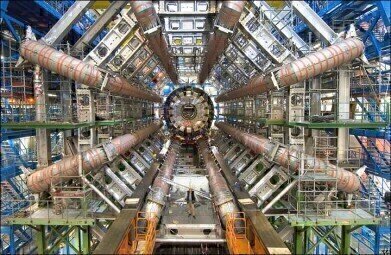News & Views
What Is the Large Hadron Collider Looking For?
Jun 02 2016
Buried 328 feet under the ground, the Large Hadron Collider (LHC) is the biggest, most ambitious machine on the planet. Pioneered by the European Organisation for Nuclear Research (aka CERN), the technological goliath scrutinises the tiniest particles in the universe, in an attempt to disentangle its secrets. Sound mysterious? The ultra-powerful particle accelerator is an incredibly complex concept, and exactly what it’s searching for is difficult to define…
Unravelling the mysteries of the universe
Ultimately, the LHC exists to win scientists new insight into the state of the universe. The brainchild of hundreds of researchers and engineers, the LHC is a mechanical pursuit of knowledge. Interestingly, a distinct practical application is notably absent. Instead, scientists are simply pursuing knowledge, for knowledge’s sake.
How does it work?
Immensely sophisticated, the LHC projects proton and ion beams at a velocity that almost hits the speed of light. These beams then collide, with scientists hoping that the aftermath will reveal more about how the universe was formed, and what it’s made up of.
In search of proof…
For some scientists, the LHC’s keynote purpose is validating the Standard Model theory. Drawing on elements from both quantum theory and Einstein's theory of relativity, the model attempts to define and explain the fundamental particles that support the existence of the universe itself. Proving the existence of the theoretical Higgs boson particle is another major goal, with advocates hoping that the LHC will confirm its validity.
Mysterious matter
The existence of matter and antimatter is another major hang up, with scientists on tenterhooks over whether or not it’s possible to observe the latter during LHC experiments. Dark matter is also a hot topic, as scientists strive to track down evidence of the illusive, undetectable material.
Confused? We don’t blame you. Wrapping your head around the concept of the Large Hadron Collider, and what exactly it’s looking for is no easy feat. Nor for that matter, are a host of exciting new developments taking place within the medical sphere. For more insight into the latest innovations, ‘What to Consider when Choosing a Thermal Cycler for Clinical Diagnostics’ introduces readers to polymerase chain reaction (PCR), one of the most powerful and sensitive gene analysis techniques available within the molecular biology field. Continual and ongoing refinement has had an enormous impact on cancer research, offering rapid and early diagnosis of diseases such as leukaemia and lymphomas.
Image via Flickr Creative Commons. Photo credits: Image Editor
Digital Edition
Lab Asia 31.2 April 2024
April 2024
In This Edition Chromatography Articles - Approaches to troubleshooting an SPE method for the analysis of oligonucleotides (pt i) - High-precision liquid flow processes demand full fluidic c...
View all digital editions
Events
Apr 24 2024 Jakarta, Indonesia
Apr 25 2024 Istanbul, Turkey
Apr 28 2024 Montreal, Quebec, Canada
May 05 2024 Seville, Spain
InformEx Zone at CPhl North America
May 07 2024 Pennsylvania, PA, USA


















